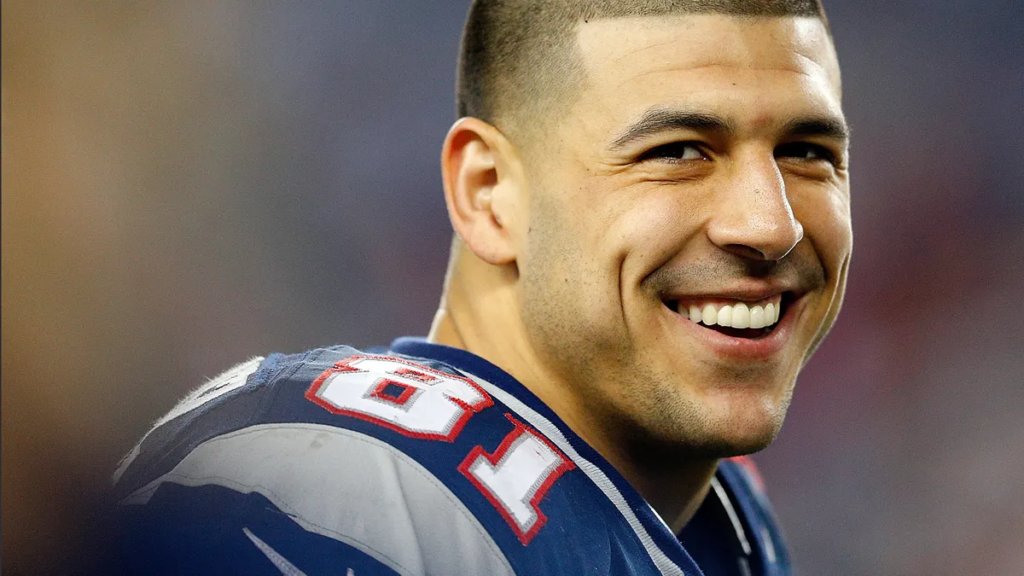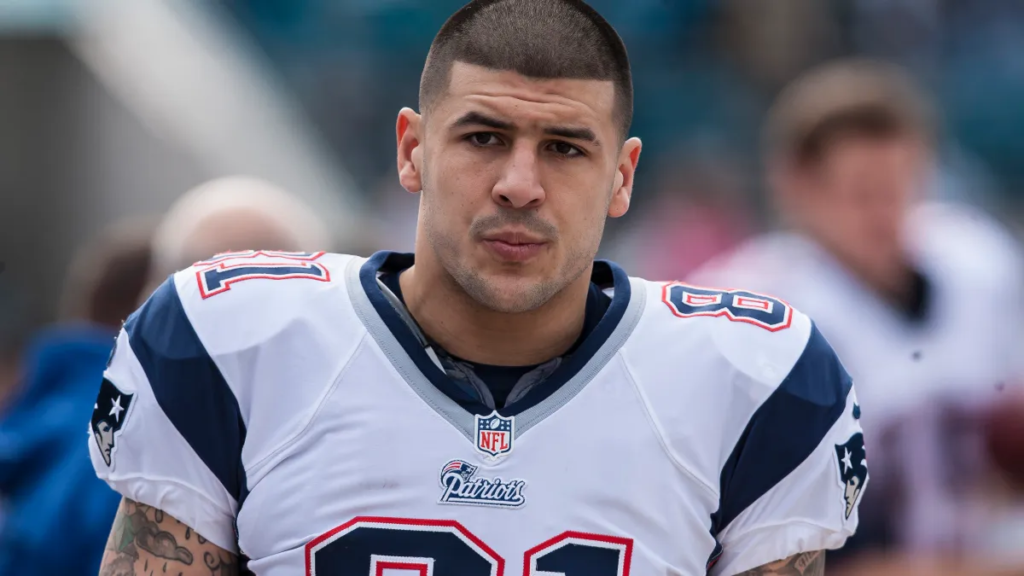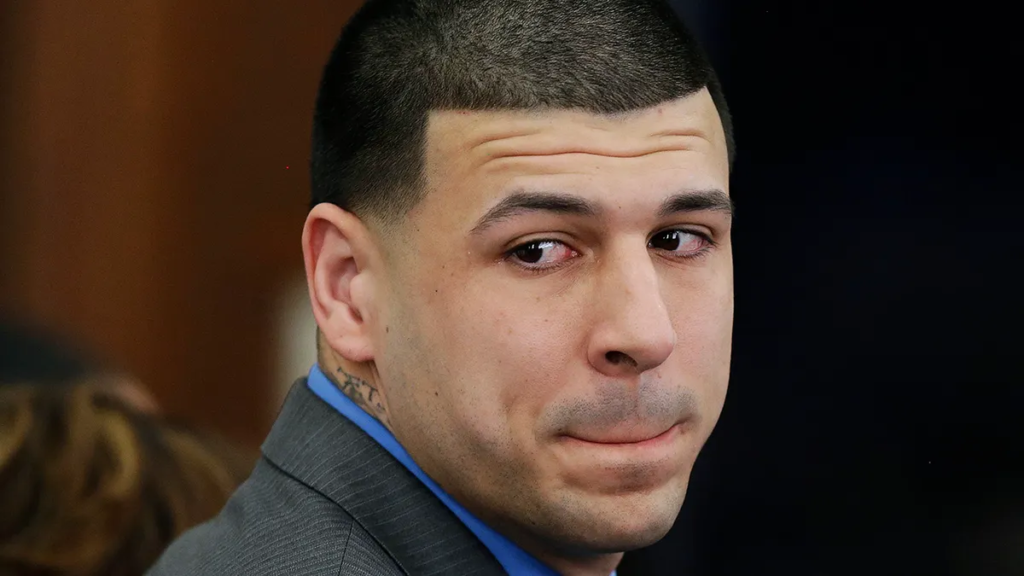Aaron Josef Hernandez, born on November 6, 1989, in Bristol, Connecticut, was a gifted professional football player whose promising career in the NFL was overshadowed by legal troubles and personal struggles. As a tight end for the New England Patriots, Hernandez demonstrated exceptional talent and earned widespread acclaim, but his descent into a life of crime led to his conviction for murder and tragic death in prison. His story serves as a cautionary tale of unfulfilled potential, the pressures faced by professional athletes, and the impact of mental health challenges and brain trauma.
Early Life and Childhood
Aaron Hernandez grew up in Bristol, Connecticut, in a family of Puerto Rican and Italian descent. His father, Dennis Hernandez, was a devoted parent and a significant influence in Aaron’s life, emphasizing discipline and hard work. Dennis had also played football in college, inspiring Aaron and his older brother, DJ Hernandez, to pursue sports. While Aaron’s father was demanding and occasionally strict, he instilled in him a love for football and a competitive spirit.
However, Aaron’s childhood was not without challenges. When Aaron was 16 years old, his father passed away unexpectedly due to complications from surgery. Dennis’s death deeply affected Aaron, resulting in behavioral changes that worried his family. Despite these challenges, Aaron excelled in sports during his high school years and became a standout athlete in football, basketball, and track at Bristol Central High School.
High School Achievements

At Bristol Central High School, Aaron Hernandez quickly became a football sensation. As a tight end, he displayed exceptional speed, strength, and versatility, earning All-State honors and national attention from college recruiters. His performances on the field included record-breaking receptions and touchdowns, helping his team secure victories and championship appearances. Aaron’s skills made him one of the top high school football prospects in the country, and he committed to the University of Florida, one of the premier college football programs.
College Career: Rising to Stardom
Aaron Hernandez joined the Florida Gators under coach Urban Meyer in 2007 and quickly made an impact. Despite being one of the youngest players on the team, Hernandez showcased his talent and earned significant playing time. By the time he was a sophomore, he had become one of the team’s leading receivers, contributing to their victory in the 2009 BCS National Championship Game.
During his three years at Florida, Hernandez earned several accolades, including:
- First-Team All-American honors in 2009.
- The prestigious John Mackey Award, given to the nation’s best collegiate tight end.
While Hernandez thrived on the field, concerns about his behavior off the field began to emerge. He reportedly failed multiple drug tests for marijuana use, and there were rumors of his involvement in fights and confrontations. These issues did not stop him from entering the 2010 NFL Draft, where his talent outweighed concerns about his character.
NFL Career: A Star Tight End

Aaron Hernandez was selected by the New England Patriots in the fourth round (113th overall) of the 2010 NFL Draft, largely due to concerns about his off-field behavior. Despite being a late-round pick, Hernandez quickly proved his worth on the field, forming a dynamic tight-end duo with Rob Gronkowski. Together, they revolutionized the Patriots’ offense with their size, athleticism, and ability to create mismatches against defenders.
Career Highlights:
- Over his three seasons (2010–2012), Hernandez recorded:
- 175 receptions
- 1,956 receiving yards
- 18 touchdowns
- He played a pivotal role in helping the Patriots reach Super Bowl XLVI in 2012.
In August 2012, Hernandez signed a $40 million contract extension, cementing his status as one of the league’s most promising young stars. His versatility and creativity as a player made him a favorite among fans and analysts.
The Fall: Legal Troubles and Arrest
Aaron Hernandez’s career came to a sudden halt in June 2013, when he was arrested for the murder of Odin Lloyd, a semi-professional football player who was dating the sister of Hernandez’s fiancée, Shayanna Jenkins. Lloyd’s body was discovered near Hernandez’s home in Massachusetts, and evidence quickly linked Hernandez to the crime. Surveillance footage, text messages, and witness testimony painted a picture of a premeditated act, shocking both the football world and the general public.
Trial and Conviction:
- In April 2015, Hernandez was found guilty of first-degree murder and sentenced to life in prison without the possibility of parole.
- While serving his sentence, Hernandez was tried for a 2012 double homicide involving two men, Daniel de Abreu and Safiro Furtado, who were fatally shot in a Boston nightclub. Hernandez was acquitted of these charges in April 2017, raising questions about inconsistencies in the case.
Death and Posthumous Revelations

Less than a week after his acquittal in the double homicide case, Aaron Hernandez was found dead in his prison cell on April 19, 2017, at the age of 27. His death was ruled a suicide by hanging, leaving unanswered questions about his state of mind and motivations.
Following his death, researchers conducted an autopsy on Hernandez’s brain and discovered he had severe chronic traumatic encephalopathy (CTE), a degenerative brain disease caused by repeated head trauma. Hernandez’s case represented one of the worst cases of CTE ever found in a young individual. The findings shed light on how CTE may have influenced Hernandez’s behavior, decision-making, and emotional instability.
Legacy and Broader Implications
Aaron Hernandez’s story has left an indelible mark on the worlds of sports, mental health, and criminal justice. His rise to fame and subsequent downfall has been the subject of numerous documentaries, including Killer Inside: The Mind of Aaron Hernandez. His case has sparked discussions about:
- CTE and Mental Health: Hernandez’s severe brain trauma highlighted the dangers of head injuries in contact sports and the need for better protocols to protect athletes.
- The Pressure of Fame: Hernandez’s inability to navigate the pressures of fame and personal challenges underscores the importance of mental health resources for athletes.
- Accountability and Second Chances: His story raises questions about the role of coaches, teams, and organizations in addressing behavioral issues and supporting players before problems escalate.
Closing Reflection
Aaron Hernandez’s life serves as both an inspiration and a cautionary tale. His athletic brilliance brought him to the pinnacle of professional sports, but his personal struggles and legal troubles led to his tragic downfall. His story continues to resonate as a reminder of the complexities of fame, the need for mental health awareness, and the long-lasting effects of brain trauma on athletes.
Also Read: Liz Golyar: A Case of Deception and Tragedy






